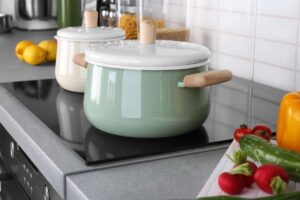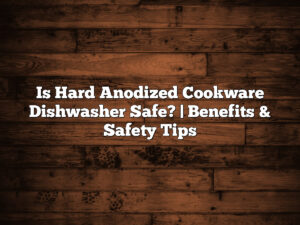Ever wandered through the cookware aisle feeling overwhelmed by the vast array of pots and pans? Choosing the right cookware can feel like a daunting task, but understanding the different materials available is a great first step. Today, we’re diving deep into the world of hard anodized cookware, a popular choice for home cooks and professional chefs alike.
Hard anodized cookware is a type of aluminum cookware that has undergone a special electrochemical process to create a tough, non-porous, and corrosion-resistant surface. This translates to a pot or pan that’s highly durable, easy to clean, and perfect for everyday cooking.
In essence, hard anodized cookware offers the best of both worlds: the affordability and even heat distribution of aluminum, combined with the enhanced strength and scratch resistance of a more robust cooking surface.
But is hard anodized cookware the perfect choice for your kitchen? Let’s explore the many benefits and drawbacks to help you make an informed decision.
Unveiling Hard Anodized Cookware
What is hard anodized cookware, and how is it made?
Hard anodized cookware starts with aluminum, a lightweight metal favored for its excellent heat conductivity. This ensures even cooking and helps prevent hot spots that can scorch your food. The aluminum then undergoes a process called anodization. During anodization, the aluminum is submerged in an electrolytic bath and exposed to an electric current. This process creates a layer of aluminum oxide, a ceramic-like compound, on the surface of the pan. This oxide layer is what gives hard anodized cookware its impressive strength and durability What Is Hard Anodized Cookware? Professional Chefs …: https://www.foodandwine.com/what-is-hard-anodized-cookware-7967434.
Key characteristics of hard anodized cookware
- Durability and Strength: One of the biggest advantages of hard anodized cookware is its exceptional durability. The anodized layer is incredibly tough and resistant to scratches, scrapes, and abrasions, making it ideal for everyday use. Unlike traditional uncoated aluminum cookware, hard anodized pans can withstand metal utensils without compromising the surface What To Know About Stainless Steel vs Hard Anodized: https://debuyer-usa.com/blogs/news/stainless-steel-vs-hard-anodized.
- Non-Stick Properties (lightly discuss – not true non-stick): While not truly non-stick like Teflon-coated pans, hard anodized cookware does develop a natural non-stick quality over time. This is because the cooking surface becomes slightly slicker with use, allowing food to release more easily. However, it’s important to remember that hard anodized cookware still requires a little oil or fat to prevent sticking, especially with delicate foods like eggs Non Stick vs. Hard Anodized Cookware: https://madeincookware.com/blogs/non-stick-vs-hard-anodized.
- Heat Conductivity: As mentioned earlier, aluminum is a fantastic heat conductor, and the anodization process doesn’t significantly impact this property. Hard anodized cookware heats up quickly and evenly, distributing heat throughout the pan for consistent cooking results.
- Safety and Reactivity: Hard anodized cookware is considered safe for cooking. The aluminum core is encased in a layer of inert aluminum oxide, which doesn’t leach into food What Is Hard Anodized Cookware? Professional Chefs …: https://www.foodandwine.com/what-is-hard-anodized-cookware-7967434. This makes it a good option for those who are concerned about potential aluminum leaching from cookware.
Advantages of Cooking with Hard Anodized Cookware
Now that we understand the key characteristics of hard anodized cookware, let’s delve into the reasons why it might be a perfect fit for your kitchen:
- Easy to clean and maintain: The smooth, non-porous surface of hard anodized cookware makes it a breeze to clean. Food residue wipes away easily, and unlike cast iron, there’s no need for seasoning. With a quick wash with warm soapy water, your hard anodized pans will be ready for their next culinary adventure.
- Long-lasting and Versatile: Hard anodized cookware is built to last. The exceptionally strong surface is resistant to warping, scratching, and chipping, ensuring years of reliable use. Its versatility makes it suitable for a wide range of cooking techniques, from searing steaks to simmering sauces.
- Affordable compared to some other options: Hard anodized cookware falls into a sweet spot in terms of price. While it’s slightly more expensive than traditional aluminum cookware, it’s significantly more affordable than some other high-end options like copper cookware.
Considerations When Using Hard Anodized Cookware
Here are a few things to keep in mind when using hard anodized cookware:
- Not completely dishwasher safe: While hard anodized cookware is generally easy to clean, it’s not recommended for the dishwasher. The harsh detergents and high heat can potentially damage the surface over time. Sticking to handwashing with warm soapy water will ensure your pans stay in top condition.
- Can scratch if not used with care: Although the surface is remarkably tough, it’s not invincible. Avoid using metal utensils like forks or knives directly on the cooking surface, as they can cause scratches. Opt for silicone or wooden utensils to preserve the smooth, non-stick properties of your hard anodized cookware.
- Limited color options: Unlike some other types of cookware, hard anodized cookware typically comes in a neutral gray color. This is a natural result of the anodization process and doesn’t affect the performance of the cookware. However, if you’re looking for a pop of color in your kitchen, you might want to consider a different material.
Hard Anodized vs. Other Popular Cookware Materials
Now that you’re familiar with the pros and cons of hard anodized cookware, let’s compare it to two other popular choices: stainless steel and ceramic cookware.
Stainless Steel Cookware:
- Pros: Stainless steel cookware is known for its exceptional durability, resistance to corrosion, and versatility. It can handle high heat and is generally dishwasher safe.
- Cons: Stainless steel doesn’t have great natural non-stick properties and can require more oil for cooking. It can also show water marks and heat discoloration easily. Stainless Steel Cookware Vs Hard Anodized Cookware: [invalid URL removed].
Ceramic Cookware:
- Pros: Ceramic cookware boasts excellent non-stick properties, even without oil or fat. It’s also relatively lightweight and easy to clean.
- Cons: Ceramic cookware can be more susceptible to chipping and cracking if dropped. It also generally doesn’t handle high heat as well as some other materials Why You Would Use Hard Anodized Cookware Construction: https://www.thespruceeats.com/anodized-cookware-construction-1907920.
Choosing the Right Cookware for You
The best type of cookware for you depends on your individual cooking style and needs. Consider the following factors when making your decision:
- Cooking habits: Do you sear a lot of meats? Do you simmer delicate sauces often? Knowing your typical cooking methods will help you choose cookware that performs well for those tasks.
- Budget: Cookware comes in a wide range of price points. Determine how much you’re comfortable spending before you start shopping.
- Maintenance preferences: How much time and effort are you willing to put into cleaning and maintaining your cookware?
Hard anodized cookware is a versatile option that offers a good balance between durability, ease of use, and affordability. However, if you’re looking for the absolute best non-stick performance, you might be happier with ceramic cookware. If you prioritize indestructible cookware suitable for high-heat cooking, stainless steel could be a better fit.
Frequently Asked Questions (FAQ) about Hard Anodized Cookware
1. Is hard anodized cookware safe?
Yes, hard anodized cookware is considered safe for cooking. The aluminum core is sealed within a layer of inert aluminum oxide, which prevents leaching into food.
2. Can I use metal utensils with hard anodized cookware?
It’s not recommended. While the surface is fairly scratch-resistant, metal utensils can cause scratches over time. Opt for silicone or wooden utensils to preserve the smooth, non-stick properties of your pans.
3. How do I season hard anodized cookware?
Unlike cast iron, hard anodized cookware doesn’t require seasoning. The surface develops a natural non-stick quality over time with regular use.
Conclusion
Hard anodized cookware is a compelling choice for home cooks seeking durable, easy-to-care-for, and versatile cookware. While it may not be the perfect fit for everyone, its combination of affordability, durability, and non-stick properties make it a popular option for kitchens around the world. We hope this comprehensive guide has helped you understand the benefits and drawbacks of hard anodized cookware.
Ready to explore the world of hard anodized cookware? Here are some things to keep in mind as you shop:
- Reputable brands: Look for cookware from reputable brands known for their quality and craftsmanship.
- Size and weight: Consider the size and weight of the cookware to ensure it’s suitable for your cooking needs and kitchen storage space.
- Features: Some hard anodized cookware sets come with lids, steamer inserts, or other helpful features. Decide which features are important to you.
With a little research and these considerations in mind, you can find the perfect set of hard anodized cookware to elevate your culinary creations for years to come.
Happy cooking!




